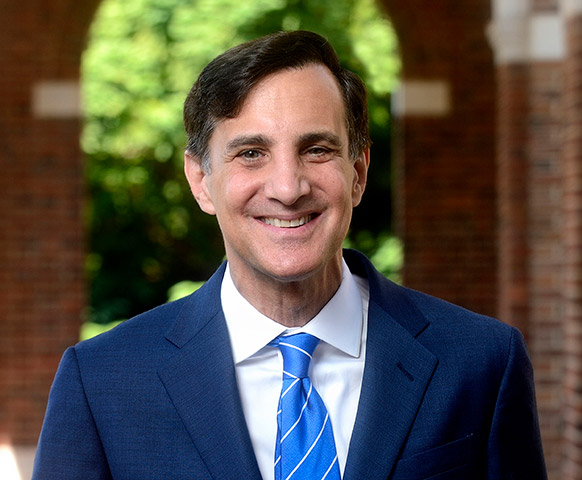
Image caption:
Ronald J. Daniels
President
This past January, I went back to class.
For the first time in 15 years, I taught a course. My students were Johns Hopkins undergraduates and the class was called Do Democracies Need Universities? As I confessed to the students, this is a leading question. My answer is an emphatic yes.
The relationship between universities and democracies is a topic I have been writing and thinking about extensively, and having the opportunity to explore it with Hopkins undergrads was intellectually thrilling.
The students in the Intersession class represented a diverse swath of majors and academic and personal backgrounds. And, in typical Hopkins fashion, they did not hesitate to pose incisive questions about our institution, or to challenge it—or me—to do more, and do better.
Over two intensive weeks, we explored how universities train citizens, promote social mobility, create robust pluralistic communities, transmit reliable knowledge into the public sphere, and fuel economic development in the communities of which they are a part. In short, all the purposes that Johns Hopkins was founded to pursue and continues to strive toward today.
One of the most exhilarating aspects of the course was how our conversations touched on important developments at Johns Hopkins in real time. These included Johns Hopkins' decision in 2014 to end legacy admissions, which I recently discussed in The Atlantic, as well as our university's interest in addressing issues of national and local import, from the impact of immigration policy on our academic community to the promise and challenges of Baltimore.
And, indeed, just days after our class immersed itself in this last topic, I gathered with partners and community leaders from across Baltimore to celebrate the success of our widely supported economic inclusion initiative, HopkinsLocal, and to launch its next phase. To date, Johns Hopkins has worked with partners and leaders across our city to hire more than 1,400 new employees from the most distressed neighborhoods in Baltimore and increase our spending with local businesses by $113 million over our baseline in 2015. For the program's next three years, we have set new and more ambitious goals that go even further in targeting the inequities of race, class, and gender that too often prevent our neighbors from realizing their highest aspirations.
At moments like this, our students were able to not only talk about but see in practice how their university is striving to requite its role in our city and in our democracy.
Being in the classroom again was a vivid reminder of what a privilege it is to live and work at a place where so many young people stand ready to grapple with difficult, complex ideas and issues and to carry their learning into the world.

Ronald J. Daniels
President







